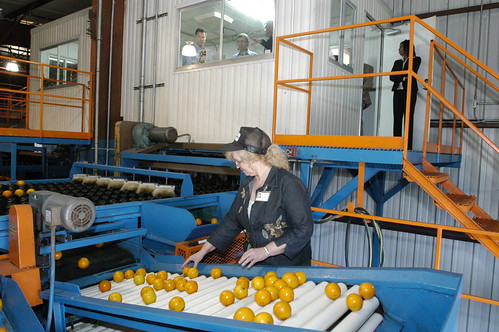
When we shop for items like orange juice at the grocery store, we often take for granted what goes on behind the scenes before we can enjoy these quality foods. Our nation’s producers and processors do not take it for granted. These products represent their livelihood, and the ability to reach new customers—especially through the export market—is critical to their businesses’ success. Recently, the USDA’s Agricultural Marketing Service (AMS) helped four businesses from Florida avert a costly 54% tariff, enabling them to continue to export frozen concentrated orange juice duty free to South Korea.
The US – Korea Free Trade Agreement (KORUS FTA) exempts U.S. orange juice from a 54% tariff when exported to Korea. However, in March 2013 Korean officials questioned the domestic origin of orange juice exported from the Sunshine State to the East Asian country. Without proof that the juice came from the U.S., exporters faced the costly tariff and the volume of exports to South Korea decreased. It was a huge loss for the Florida citrus industry which creates 76,000 jobs and pumps $9 billion into its local economy.
To help these businesses avert the tariff, our Specialty Crops Inspection Division (SCI) positioned itself to certify that the orange juice was produced domestically. Using mechanisms in place for federal food purchasing programs like the National School Lunch Program, the division worked with the companies to produce documents that traced back the juice’s origin. These programs require domestically-produced foods. In this case, the companies had to keep paperwork that traces the juice’s origin all the way back to the groves.
After reviewing this paperwork and taking several trips to orange juice processing plants and orange groves, Korean officials agreed in April 2014 that the juice was produced domestically. Resolving this trade issue with Korea—the sixth largest market for U.S. agricultural exports in 2013—was a huge success for the orange juice industry. As a result, exporters can continue to send their quality products duty free to the country’s nearly 50 million consumers.
The resolution was a significant success for the U.S. government, celebrating the second anniversary of the KORUS FTA and the growing economic relationship with Korea. The resolution was made possible in partnership with the Foreign Agricultural Service (FAS), of USDA, as well as the U.S. Department of State, the Office of the US Trade Representative, U.S. Customs and Border Protection and the U.S. Department of Commerce.
Helping U.S. orange juice exporters certify origin is just one of the ways that AMS provides services to help our nation’s producers and processors successfully reach new markets. We encourage produce businesses to visit our Fruit and Vegetable Program site to see how we can help out your business. From verifying the quality of your products through inspections to helping you sell food to USDA, our agency is committed to creating opportunities for the domestic produce industry.

